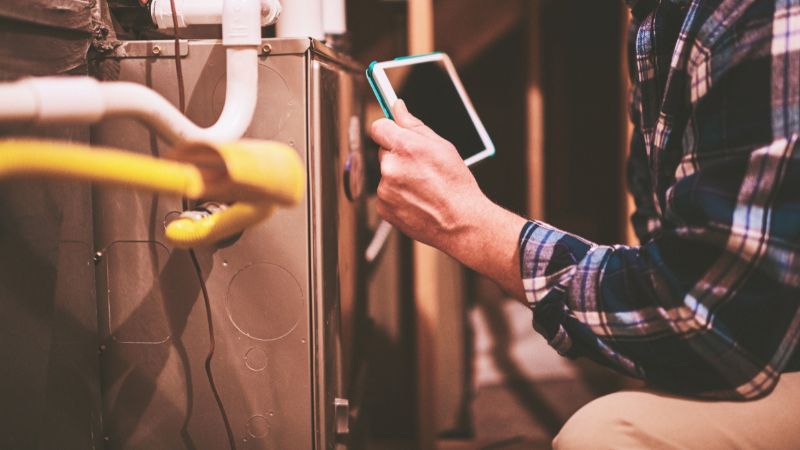
Emergency AC Repair: What To Do When Your System Breaks Down
TL;DR: AC breakdowns are a nightmare, especially in extreme temperatures. Recognize signs of trouble like unusual noises, weak airflow, warm air, bad smells, or leaks. Take immediate action: turn off the system, check the thermostat, inspect the circuit breaker, and examine air filters. Some issues require professional help, especially complex technical issues, refrigerant leaks, and electrical failures. Contact Thermodynamics Mechanical in Mesquite, Texas, for 24/7 emergency AC repair and regular maintenance to avoid future breakdowns.
When your AC stops working, particularly during the scorching summer months or the bitter cold of winter, you must get it back up and running as soon as possible. Considering that almost 95% of Texans rely on air conditioning to keep their home cool, the importance of a fully functional AC system isn’t something to take lightly.
Investing time and effort into maintaining your AC can significantly extend its lifespan and prevent many issues. However, breakdowns can still occur unexpectedly. No one plans for their AC to fail, yet when it does, you’re thrust into a scramble to get it fixed before your home turns into an oven or an icebox.
This post aims to guide you through the immediate steps to take when facing an emergency AC repair. What to do when your system breaks down isn’t always obvious, but with the right approach, you can minimize the disruption to your life and get your AC back up and running.
Signs Your AC System Is Failing
Your AC system usually warns you when something’s off. It’s important to catch the signs early and act swiftly to prevent more significant troubles. But what are these telltale signs of a failing AC? They range from the sounds your unit makes to the quality of air it pumps out.
- Unusual noises: If your AC sounds more like it’s trying to communicate through Morse code than cool your home, it’s time for a check-up. Humming, buzzing, or rattling noises aren’t part of its operation. These sounds often point to mechanical issues, loose parts, or electrical problems.
- Weak airflow: This is a clear sign that your AC isn’t performing as it should. Weak airflow might mean a blockage in your ducts, a failing compressor, or even something as simple as a dirty filter. It’s a problem because a struggling AC means increased wear and tear and possibly higher energy bills.
- Warm air or inconsistent temperatures: If you’ve set your AC to chill and it’s puffing out warm air, or if some rooms are chilly while others feel like saunas, something’s wrong. That could be due to low refrigerant levels, a malfunctioning compressor, or even leaky ductwork.
- Bad smells: If turning on your AC brings a wave of musty or burnt scents, don’t ignore it. These odors could indicate mold or mildew in your system or wiring issues. Not only do these smells make your space unpleasant, but they can be health risks and fire hazards.
- Leaks: Water or refrigerant leaking from your AC system spells trouble. Water leaks could lead to mold growth and structural damage to your home, while refrigerant leaks are hazardous to your health and the environment.
Immediate Actions to Take After AC System Failure
When you first notice something’s off with your AC system, be it weird noises or the unit not cooling your space as it should, you must try to find a solution immediately. Recognizing the symptoms early and taking action can prevent your AC system from further damage, which could otherwise lead to a complete system failure. So, what steps can you take to attempt repairs?
Turn Off Your AC System
The moment you suspect a problem, turn off your AC system. Continuing to run a faulty unit can exacerbate the issue, turning a minor fix into a major repair job. That will also make it safer for you to inspect and troubleshoot the various components of your AC without the risk of causing more harm.
Check Your Thermostat
Believe it or not, the thermostat is often the culprit behind AC mishaps, so check the following:
- Dead batteries: Swap out old batteries for new ones to see if that gets your system back up and running.
- Incorrect settings: Make sure your thermostat is set to “cool” and not “heat” or “off.”
- Resetting the thermostat: Sometimes, all your thermostat needs is a reset. Check the manual for instructions on how to do this for your specific model.
Inspect the Circuit Breaker and Power Supply
If the breaker connected to your AC system has tripped, flip it back and see if that solves the problem. Check if any external power switches for your AC unit got turned off by accident. These steps help verify that the issue isn’t just a simple power supply problem, which is far easier and cheaper to fix.
Examine the Air Filters
Dirty or clogged filters can severely restrict airflow, leading to overheating and eventual failure. Make it a habit to inspect your filters regularly and clean or replace them as needed. This will promote better air quality in your home and help the AC work more efficiently, using up to 15% less energy.
When to Call a Professional for Emergency AC Repair
While a quick Google search might make you feel like a DIY expert, some issues are too complex or dangerous to tackle alone. Every homeowner must recognize when to step back and call in a professional for emergency AC repair to keep the system running smoothly without putting themselves at risk.
AC malfunctions that affect the core operation of your unit are jobs for an experienced AC repairman. Let’s break down these issues to help you understand when to pick up the phone.
Complex Technical Issues
Some problems with your AC unit can seem straightforward but require specialized knowledge to fix them properly. If your AC is making unusual noises, failing to cool efficiently, or cycling on and off too frequently, these could be signs of underlying complex technical issues.
Components like the compressor, fan motors, or evaporator coils are intricate and integral to your AC’s functionality. Repairing these parts yourself without the right tools and expertise can cause other problems.
Refrigerant Leaks
Refrigerant leaks can spell disaster for your system’s efficiency and safety. They are also not good for the environment. These leaks can be hard to spot while fixing them goes beyond patching a hole and refilling the refrigerant. You must use the correct type and amount of refrigerant and test the system to ensure no other leaks are present.
That is a job for someone who knows their way around an AC system, as incorrect handling can damage your unit and lead to potentially harmful exposure for you and your family.
Electrical Failures
Tinkering with the electrical components of your AC unit is a recipe for trouble. From blown fuses and tripped circuit breakers to more severe issues like a malfunctioning thermostat or an electrical short, these problems require a professional touch.
Attempting DIY repairs on electrical components risks further damage to your AC and poses a significant safety hazard to you. Always leave electrical work to professionals with the training and tools to diagnose and safely fix the issue.
Who To Call For An AC Emergency
A quick reaction can help prevent further damage and discomfort when your AC system hits a snag and you need an emergency AC repair. What to do when your system breaks down is easier to navigate when you have a professional AC technician on speed dial.
In such cases, Thermodynamics Mechanical in Mesquite, Texas, is ready to answer your call. AC trouble can happen anytime, so you can reach us 24/7. Our experts can tackle any AC issue. We know you’ll be satisfied with our work and call us even when there isn’t an emergency.
We can help you regularly maintain your AC system to avoid unpleasant surprises in the middle of summer. To give your AC a thorough spring cleaning, call us today!
Table of Contents
Other Blogs You May Be Interested In
Categories









Leave a Reply